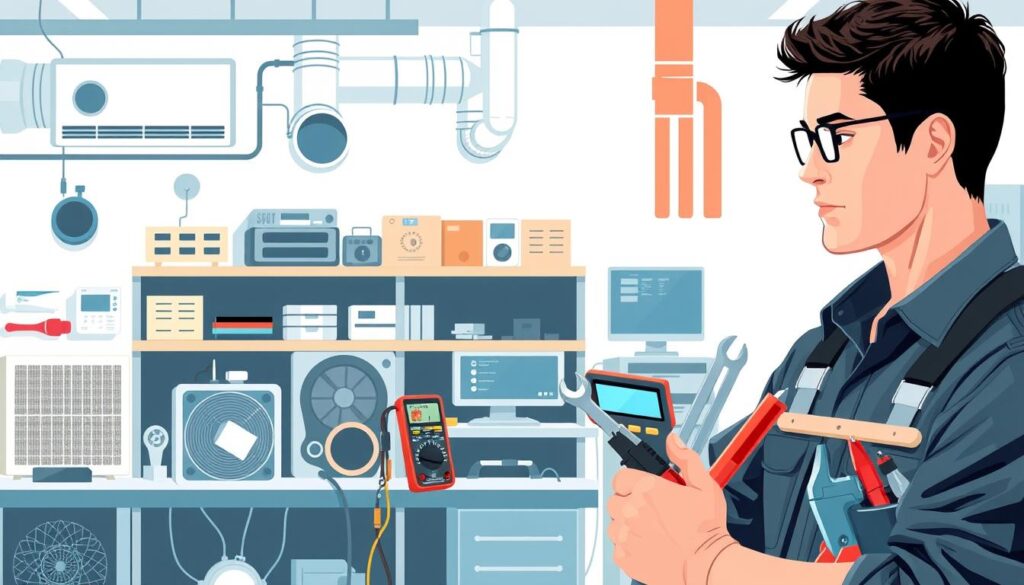Affiliate Disclosure
HVAC Guide Guys is a participant in the Amazon Services LLC Associates Program, an affiliate advertising program designed to provide a means for sites to earn advertising fees by advertising and linking to Amazon.
How Tough Is HVAC? Ever wondered what it takes to survive in the high-stakes world of HVAC? Are you ready to discover whether you have what it takes to thrive in one of America’s most demanding technical careers?

The HVAC industry is more than just controlling temperatures. It’s a challenging career that needs physical strength, technical skills, and problem-solving abilities. HVAC career challenges go beyond simple equipment maintenance. They require professionals to navigate complex technical landscapes and work in unpredictable environments.
How tough is HVAC? This career isn’t for the faint of heart. You’ll face intense physical demands, complex technical challenges, and a dynamic work environment that tests your limits daily. HVAC professionals must be versatile, resilient, and continuously learning. They need to crawl through tight spaces and diagnose complex system failures.
Key Takeaways
- HVAC careers require a unique blend of technical and physical skills
- Professionals must be adaptable and committed to continuous learning
- Career offers competitive compensation and job stability
- Physical demands are significant and require good health
- Technical knowledge is key for success in this field
Table of Contents
Understanding the Basics of HVAC Systems
HVAC systems are complex networks of equipment designed to create comfortable indoor environments. As you explore the world of heating, ventilation, and air conditioning, you’ll discover a fascinating blend of engineering and technical expertise. This requires a deep understanding of HVAC systems.
Professional HVAC technicians must develop a deep understanding of how these systems operate. The field demands specialized knowledge that goes beyond simple maintenance.
Core Components and Functions
Every HVAC system comprises several critical elements that work together seamlessly:
- Compressor: Pressurizes refrigerant
- Condenser: Releases heat from the system
- Evaporator: Absorbs indoor heat
- Thermostat: Controls temperature settings
Fundamental Operating Principles
Understanding the basic principles of heat transfer is key. HVAC systems rely on thermodynamic processes to regulate indoor temperatures.
“Mastering HVAC is about understanding energy movement, not just mechanical components.” – HVAC Engineering Experts
System Types and Applications
| System Type | Primary Use | Key Characteristics |
|---|---|---|
| Split System | Residential Cooling | Separate indoor and outdoor units |
| Packaged System | Commercial Spaces | Compact single-unit design |
| Ductless Mini-Split | Targeted Temperature Control | Flexible zone heating/cooling |
By understanding these basics, you’ll build a strong foundation in HVAC technology. This prepares you for a dynamic, challenging career in this essential industry.
Explore Our HVAC Shop
Looking for top-rated HVAC tools, parts, and accessories? Visit our shop and find the perfect solution for your needs.
Visit the ShopPhysical Demands and Working Conditions
HVAC technicians face tough physical demands. They need to be strong and have lots of endurance. The job requires being ready for different and sometimes extreme conditions.
This career is uniquely challenging due to several key aspects:
- Lifting heavy equipment weighing up to 50-100 pounds
- Working in tight, confined spaces like attics and crawl spaces
- Climbing ladders and navigating difficult work sites
- Exposure to extreme temperatures during system installations
Your day might include crawling through narrow spaces, carrying heavy tools, and staying in uncomfortable positions for a long time. You must stay physically fit to do these tasks safely and well.
“HVAC work is not for the faint of heart. It demands physical resilience and mental toughness.” – Professional HVAC Technician
Safety is a top priority in this job. You’ll need protective gear like heavy-duty gloves, safety glasses, and steel-toed boots. Be ready for risks like electrical hazards, sharp metal edges, and falls.
- Core physical requirements:
- Strength and stamina
- Flexibility
- Balance
- Manual dexterity
Despite the challenges, many find HVAC work rewarding. It offers constant movement, problem-solving, and the joy of fixing things with your hands.
Technical Knowledge Requirements
To become an HVAC pro, you need a mix of technical know-how and hands-on skills. Success in the HVAC field relies on mastering key technical skills. HVAC training focuses on these skills to tackle complex system issues.
HVAC certification requires a deep understanding of various specialized areas. You must grasp electrical systems, math, and mechanical principles. This knowledge helps you fix and maintain advanced heating, cooling, and ventilation systems.
Electrical Systems Understanding
Electrical knowledge is essential for HVAC skills. You’ll learn about:
- Circuit diagram interpretation
- Voltage and amperage measurements
- Electrical safety protocols
- Wiring configuration techniques
Mathematics and Calculations
Accurate math skills are vital for HVAC pros. Your math skills should include:
- Load calculations for system sizing
- Energy efficiency computations
- Thermodynamic equation solving
- Performance metric assessments
Mechanical Principles
Knowing mechanical principles is key to fixing complex HVAC systems. Focus on:
| Mechanical Skill | Practical Application |
|---|---|
| Pressure dynamics | System performance optimization |
| Heat transfer mechanisms | Efficiency improvement strategies |
| Fluid dynamics | Refrigerant flow analysis |
Building these technical skills takes hard study and hands-on practice. Your HVAC certification path will test your ability to blend electrical, math, and mechanical knowledge. This blend is key to solving problems smoothly.
Explore Our HVAC Shop
Looking for top-rated HVAC tools, parts, and accessories? Visit our shop and find the perfect solution for your needs.
Visit the ShopHow Tough Is HVAC: Breaking Down the Challenges
HVAC professionals face many challenges that test their skills and adaptability. To understand how tough HVAC is, we need to look at the many demands of this important field.
The first challenge is the technical complexity. You’ll deal with complex systems that need precise skills and problem-solving. Each job has its own unique problems that require quick thinking and technical knowledge.
- Constant technological advancements challenge technicians to stay current
- Extreme working environments test physical and mental endurance
- High-pressure situations require calm and strategic decision-making
“Success in HVAC isn’t just about technical knowledge—it’s about adaptability and continuous learning.” – HVAC Industry Expert
The physical demands of HVAC work are also significant. You’ll work in tight spaces, lift heavy equipment, and face extreme temperatures. This job requires great physical fitness and mental toughness.
| Challenge Category | Key Difficulties | Required Skills |
|---|---|---|
| Technical Complexity | Advanced system diagnostics | Problem-solving, analytical thinking |
| Physical Demands | Heavy lifting, confined spaces | Strength, flexibility, endurance |
| Technological Evolution | Rapid system innovations | Continuous learning, adaptability |
Your success in HVAC depends on facing these challenges head-on. Keep learning, stay passionate about technology, and grow professionally. This will help you thrive in this demanding yet rewarding field.
Training and Certification Path
Becoming an HVAC technician is a journey that needs a plan. It involves formal education, hands-on training, and keeping your skills sharp.
HVAC training is detailed and prepares you for a rewarding career. It has several stages that turn you from a beginner to a pro.
Educational Requirements
Your HVAC career begins with specific education. Most employers look for candidates with training from:
- Technical schools
- Community colleges
- Vocational programs
- Apprenticeship programs
Licensing and Certifications
HVAC certification is key for credibility. States have different licensing rules, but most require:
- Approved training program completion
- Passing a state exam
- Work experience
- Keeping certifications up to date
HVAC apprenticeships are great for learning by doing while earning. They last 3-5 years, mixing classroom learning with real-world training.
| Certification Type | Requirements | Duration |
|---|---|---|
| EPA Section 608 | Refrigerant handling certification | 1-2 days |
| NATE Certification | Technical knowledge exam | 2-4 hours |
| State License | Exam and work experience | Varies by state |
Continuing Education
Keeping up with new tech is vital. Most professionals do ongoing training to keep their licenses and learn new skills.
Your dedication to learning is what will make you a top HVAC technician. See every educational chance as a step towards success.
Explore Our HVAC Shop
Looking for top-rated HVAC tools, parts, and accessories? Visit our shop and find the perfect solution for your needs.
Visit the ShopEssential Skills for Success

Building a strong hvac skillset is key to doing well in the heating, ventilation, and air conditioning field. You need to master technical and people skills to stand out in the competitive job market.
Technical skills are the base of your HVAC career. You must be good at:
- Advanced system diagnostics
- Precision repair techniques
- Complex equipment troubleshooting
- Understanding electrical and mechanical systems
Soft skills are just as vital in making you a top HVAC pro. Employers look for technicians who can:
- Communicate clearly with customers
- Solve problems creatively
- Manage time well
- Adapt to changing work environments
Mixing technical know-how with strong people skills will boost your job chances. Keep learning, pay attention to details, and grow professionally. This will help you succeed in this fast-paced field.
“Success in HVAC is about more than just fixing equipment—it’s about building trust and solving real-world challenges.” – HVAC Industry Expert
Daily Responsibilities and Workload
HVAC professionals face a dynamic and challenging work environment. They need versatility, technical skills, and quick thinking. Your daily tasks will test your technical abilities and personal resilience.
The HVAC work environment is diverse. Technicians handle various tasks to keep systems running smoothly. Your workday might include different responsibilities that require different skills.
Routine Maintenance Tasks
Routine maintenance is key in HVAC work. You’ll be responsible for:
- Inspecting system components
- Cleaning air filters
- Checking refrigerant levels
- Lubricating moving parts
- Calibrating thermostats
Emergency Repairs
Unexpected system failures need quick action. Urgent situations can arise at any moment. You must diagnose and solve problems fast. These situations test your technical knowledge and problem-solving skills.
Customer Service Duties
You’ll also interact with clients. Good communication skills are essential. You’ll:
- Explain technical issues simply
- Provide repair recommendations
- Offer cost estimates
- Schedule follow-up services
Your success depends on balancing technical skills with strong interpersonal abilities. This demanding profession requires both.
Explore Our HVAC Shop
Looking for top-rated HVAC tools, parts, and accessories? Visit our shop and find the perfect solution for your needs.
Visit the ShopCareer Growth and Industry Outlook

The HVAC industry is full of exciting career paths for skilled workers. Your growth in this field is limitless, with many chances to specialize in different areas.
Today, the HVAC job market is strong and full of promise. It’s changing fast, thanks to new tech and a growing need for energy-saving solutions.
- Renewable energy integration
- Smart home technology implementation
- Commercial and residential system optimization
- IoT-enabled HVAC controls
The outlook for the HVAC industry is bright. You can look forward to good pay and many career options. Areas like green tech and advanced diagnostics are very promising.
| Specialization Area | Projected Growth | Average Salary Range |
|---|---|---|
| Residential HVAC | 4-6% annually | $45,000 – $65,000 |
| Commercial Systems | 5-7% annually | $55,000 – $75,000 |
| Green Technology | 8-10% annually | $60,000 – $85,000 |
Boosting your career means always learning and improving. Certifications in new tech will keep you ahead in the HVAC world.
“The future of HVAC is not just about temperature control, but about creating intelligent, sustainable environments.” – HVAC Industry Expert
Planning your career well and keeping up with new tech is key to success in this fast-changing field.
Conclusion
Understanding the HVAC industry’s challenges and opportunities is key. This technical profession requires physical stamina, technical skills, and a commitment to learning. The challenges are real, but the rewards are great for those who put in the effort.
HVAC job prospects are strong in the U.S., with a growing need for skilled technicians. Success depends on mastering technical skills, staying physically fit, and solving problems well. The field values those who keep up with new technologies and learn actively.
The HVAC industry offers stable jobs, good pay, and chances for advancement. You’ll need to be resilient, know your technical stuff, and love solving complex problems. Knowing what this career entails helps you decide if it’s right for you.
A career in HVAC is about more than just technical skills. It’s about helping communities, solving big infrastructure problems, and working towards a sustainable future. Your dedication to doing great work and your openness to learning will make you stand out in this rewarding field.

